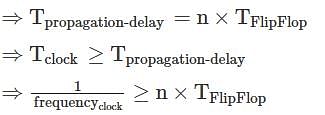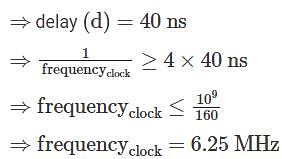Computer Science Engineering (CSE) Exam > Computer Science Engineering (CSE) Questions > Each flip-flop in a 4-bit ripple counter intr...
Start Learning for Free
Each flip-flop in a 4-bit ripple counter introduces a maximum delay of 40 n sec. The maximum clock frequency is:
- a)2.65 MHz
- b)6.25 MHz
- c)5.26 MHz
- d)6.52 MHz
Correct answer is option 'B'. Can you explain this answer?
| FREE This question is part of | Download PDF Attempt this Test |
Most Upvoted Answer
Each flip-flop in a 4-bit ripple counter introduces a maximum delay of...
Given information:
- Each flip-flop in a 4-bit ripple counter introduces a maximum delay of 40 nsec.
- We need to find the maximum clock frequency.
To find the maximum clock frequency, we need to consider the worst-case scenario where the delay of each flip-flop is maximum. In a ripple counter, the output of one flip-flop is connected to the clock input of the next flip-flop.
The maximum delay introduced by each flip-flop is 40 nsec. So when the clock signal arrives at the first flip-flop, it takes 40 nsec for the output of the first flip-flop to propagate to the input of the second flip-flop. Similarly, it takes another 40 nsec for the output of the second flip-flop to propagate to the input of the third flip-flop, and so on.
This means that the total delay introduced by the ripple counter is the sum of the delays of all the flip-flops. Since there are 4 flip-flops in a 4-bit ripple counter, the total delay is 4 * 40 nsec = 160 nsec.
Now, the maximum clock frequency is the reciprocal of the total delay. In other words, it is the maximum number of clock cycles that can occur in 1 second. Since the delay is given in nanoseconds, we need to convert it to seconds by dividing it by 10^9.
Thus, the maximum clock frequency is 1 / (160 nsec / 10^9) = 10^9 / 160 = 6.25 MHz.
Therefore, the correct answer is option 'B': 6.25 MHz.
- Each flip-flop in a 4-bit ripple counter introduces a maximum delay of 40 nsec.
- We need to find the maximum clock frequency.
To find the maximum clock frequency, we need to consider the worst-case scenario where the delay of each flip-flop is maximum. In a ripple counter, the output of one flip-flop is connected to the clock input of the next flip-flop.
The maximum delay introduced by each flip-flop is 40 nsec. So when the clock signal arrives at the first flip-flop, it takes 40 nsec for the output of the first flip-flop to propagate to the input of the second flip-flop. Similarly, it takes another 40 nsec for the output of the second flip-flop to propagate to the input of the third flip-flop, and so on.
This means that the total delay introduced by the ripple counter is the sum of the delays of all the flip-flops. Since there are 4 flip-flops in a 4-bit ripple counter, the total delay is 4 * 40 nsec = 160 nsec.
Now, the maximum clock frequency is the reciprocal of the total delay. In other words, it is the maximum number of clock cycles that can occur in 1 second. Since the delay is given in nanoseconds, we need to convert it to seconds by dividing it by 10^9.
Thus, the maximum clock frequency is 1 / (160 nsec / 10^9) = 10^9 / 160 = 6.25 MHz.
Therefore, the correct answer is option 'B': 6.25 MHz.
Free Test
FREE
| Start Free Test |
Community Answer
Each flip-flop in a 4-bit ripple counter introduces a maximum delay of...
Synchronous counter: In this all the flip-flops work in sync with clock pulse as well as each other. Here clock pulse is applied to every flip flop simultaneously.
Asynchronous counter: In this clock pulse is applied only to the initial flip flop whose value would be considered as LSB. Instead of the clock pulse, the output of the first flip-flop acts as a clock pulse to the next flip-flop, whose output is used as a clock to the next in-line flip-flop and so on.
Ripple Counter:
- Ripple counter is an asynchronous counter.
- It got its name because the clock pulse ripples through the circuit.
- An n−MOD ripple counter contains n number of flip-flops and the circuit can count up to 2 n values before it resets itself to the initial value.
Maximum clock frequency is given by:

Now,
n = 4
⇒ delay (d) = 40 ns

Hence, the correct option is (B).
Attention Computer Science Engineering (CSE) Students!
To make sure you are not studying endlessly, EduRev has designed Computer Science Engineering (CSE) study material, with Structured Courses, Videos, & Test Series. Plus get personalized analysis, doubt solving and improvement plans to achieve a great score in Computer Science Engineering (CSE).

|
Explore Courses for Computer Science Engineering (CSE) exam
|

|
Similar Computer Science Engineering (CSE) Doubts
Each flip-flop in a 4-bit ripple counter introduces a maximum delay of 40 n sec. The maximum clock frequency is:a)2.65 MHzb)6.25 MHzc)5.26 MHzd)6.52 MHzCorrect answer is option 'B'. Can you explain this answer?
Question Description
Each flip-flop in a 4-bit ripple counter introduces a maximum delay of 40 n sec. The maximum clock frequency is:a)2.65 MHzb)6.25 MHzc)5.26 MHzd)6.52 MHzCorrect answer is option 'B'. Can you explain this answer? for Computer Science Engineering (CSE) 2024 is part of Computer Science Engineering (CSE) preparation. The Question and answers have been prepared according to the Computer Science Engineering (CSE) exam syllabus. Information about Each flip-flop in a 4-bit ripple counter introduces a maximum delay of 40 n sec. The maximum clock frequency is:a)2.65 MHzb)6.25 MHzc)5.26 MHzd)6.52 MHzCorrect answer is option 'B'. Can you explain this answer? covers all topics & solutions for Computer Science Engineering (CSE) 2024 Exam. Find important definitions, questions, meanings, examples, exercises and tests below for Each flip-flop in a 4-bit ripple counter introduces a maximum delay of 40 n sec. The maximum clock frequency is:a)2.65 MHzb)6.25 MHzc)5.26 MHzd)6.52 MHzCorrect answer is option 'B'. Can you explain this answer?.
Each flip-flop in a 4-bit ripple counter introduces a maximum delay of 40 n sec. The maximum clock frequency is:a)2.65 MHzb)6.25 MHzc)5.26 MHzd)6.52 MHzCorrect answer is option 'B'. Can you explain this answer? for Computer Science Engineering (CSE) 2024 is part of Computer Science Engineering (CSE) preparation. The Question and answers have been prepared according to the Computer Science Engineering (CSE) exam syllabus. Information about Each flip-flop in a 4-bit ripple counter introduces a maximum delay of 40 n sec. The maximum clock frequency is:a)2.65 MHzb)6.25 MHzc)5.26 MHzd)6.52 MHzCorrect answer is option 'B'. Can you explain this answer? covers all topics & solutions for Computer Science Engineering (CSE) 2024 Exam. Find important definitions, questions, meanings, examples, exercises and tests below for Each flip-flop in a 4-bit ripple counter introduces a maximum delay of 40 n sec. The maximum clock frequency is:a)2.65 MHzb)6.25 MHzc)5.26 MHzd)6.52 MHzCorrect answer is option 'B'. Can you explain this answer?.
Solutions for Each flip-flop in a 4-bit ripple counter introduces a maximum delay of 40 n sec. The maximum clock frequency is:a)2.65 MHzb)6.25 MHzc)5.26 MHzd)6.52 MHzCorrect answer is option 'B'. Can you explain this answer? in English & in Hindi are available as part of our courses for Computer Science Engineering (CSE).
Download more important topics, notes, lectures and mock test series for Computer Science Engineering (CSE) Exam by signing up for free.
Here you can find the meaning of Each flip-flop in a 4-bit ripple counter introduces a maximum delay of 40 n sec. The maximum clock frequency is:a)2.65 MHzb)6.25 MHzc)5.26 MHzd)6.52 MHzCorrect answer is option 'B'. Can you explain this answer? defined & explained in the simplest way possible. Besides giving the explanation of
Each flip-flop in a 4-bit ripple counter introduces a maximum delay of 40 n sec. The maximum clock frequency is:a)2.65 MHzb)6.25 MHzc)5.26 MHzd)6.52 MHzCorrect answer is option 'B'. Can you explain this answer?, a detailed solution for Each flip-flop in a 4-bit ripple counter introduces a maximum delay of 40 n sec. The maximum clock frequency is:a)2.65 MHzb)6.25 MHzc)5.26 MHzd)6.52 MHzCorrect answer is option 'B'. Can you explain this answer? has been provided alongside types of Each flip-flop in a 4-bit ripple counter introduces a maximum delay of 40 n sec. The maximum clock frequency is:a)2.65 MHzb)6.25 MHzc)5.26 MHzd)6.52 MHzCorrect answer is option 'B'. Can you explain this answer? theory, EduRev gives you an
ample number of questions to practice Each flip-flop in a 4-bit ripple counter introduces a maximum delay of 40 n sec. The maximum clock frequency is:a)2.65 MHzb)6.25 MHzc)5.26 MHzd)6.52 MHzCorrect answer is option 'B'. Can you explain this answer? tests, examples and also practice Computer Science Engineering (CSE) tests.

|
Explore Courses for Computer Science Engineering (CSE) exam
|

|
Suggested Free Tests
Signup for Free!
Signup to see your scores go up within 7 days! Learn & Practice with 1000+ FREE Notes, Videos & Tests.
























